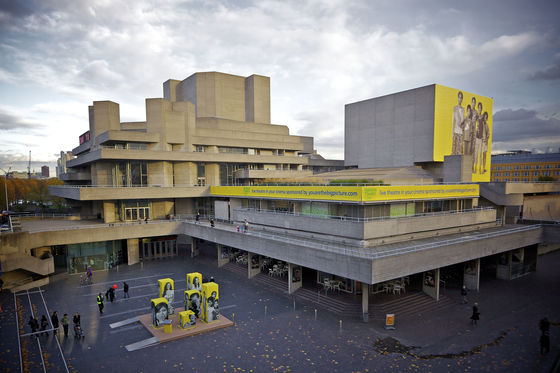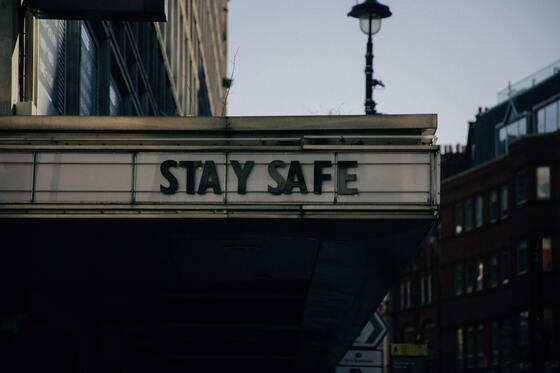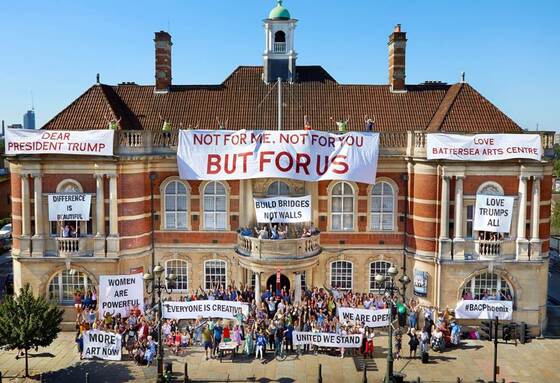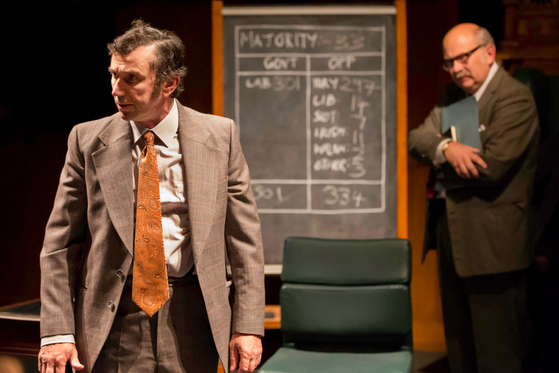Theatre letter from London (4) - How the the conversation about why the UK’s theatre must be saved should change
Not Another Failing Business
by Alice Saville
London, 14 June 2020. Theatre is good at stories. Telling them, retelling them, and using novel forms to make them bite in new ways. And as the coronavirus pandemic makes live theatre performances all but impossible, the UK theatres must marshall all their resources to tell a story that's both painful, and central to their survival; the one which explains why theatre companies and buildings must be preserved in a time of crisis.
The UK has the shameful distinction of having one of the highest coronavirus-related death tolls in the world. There's been a widespread collapse of faith in a government that has put 'business as usual' over lives. And although the government's furlough scheme has allowed theatres (alongside other hard-hit businesses) to stay afloat for now, this support will be tapered down until it finishes in October. But the same government has also said that social distancing will remain in place until 2021 – and UK venues' heavy reliance on ticket income means that the kind of partially empty auditoriums being trialled by the Berliner Ensemble will be a financial impossibility.
Investments, not bailouts
So what now? Although the government's Culture Secretary Oliver Dowden has said that "I will not stand by and see the arts destroyed", so far he’s remained largely silent, as regional venues like Leicester’s Haymarket Theatre, Southport Theatre and Nuffield Southampton Theatre have already gone bust.
As the UK's theatre artists eagerly await news, they’re taking to the newspapers and airwaves to urge the government to take action. Playwright James Graham was one of the first key voices to push support for theatre onto the government's agenda; in a powerful speech on BBC's Question Time, he called for "an investment", rather than a bailout, to secure the theatre industry's future. But as he explains, he felt uneasy with this sudden lurch into the spotlight; "We're constantly asking the government to give us money so we can hold them to account, which is a strange position to be in."
 London's National Theatre, home to blockbuster production "This House" © CC BY-SA 2.0
London's National Theatre, home to blockbuster production "This House" © CC BY-SA 2.0
Still, it's something that political dramas like National Theatre's blockbuster "This House" make him uncommonly well placed to do. "I spend a lot of time in my imagination wandering the corridors of power. For better or for worse, I write the kind of plays that politicians come to see. How can I exploit that work, to remind them of theatre's vulnerabilities?"
As he explains, this is a government that communicates disproportionately through the media; Prime Minister Boris Johnson spent much of his prior career working as a newspaper columnist. "Ideas are road tested by being leaked to the newspapers. This is government as almost entirely communication rather than policy-making."
Bandying about numbers
Critic Kate Maltby took this idea still further when she wrote a controversial article in The Stage, which asked arts leaders to learn to "talk Tory". It argued that the case for preserving theatre should rely on three central themes; economic prosperity, mental health, and theatre building’s role as civic hubs. But is that approach ignoring everything that makes it, well, theatre?
Director Omar Elerian vigorously disagrees with the assumption that we should 'learn to speak Tory'. "I find that argument completely naive, because it’s based on the assumption that we have to work within dominant structures, and pander to them for any breadcrumbs they might give you". Before he moved to the UK, he lived in France – and he speaks admiringly of a culture where artists vigorously protested cuts, instead of mutely accepting them.
Often, learning to "talk Tory" means bandying about numbers; one popular statistic is that the government gains £5 in tax for every £1 invested in the arts. But what do these numbers actually mean, when they include tax on everything from videogame sales to pre-theatre meal deals? As Professor Eleonora Belfiore explains, "my research shows that these kind of arguments increase in visibility when the arts feel threatened. It's a defensive strategy. The problem as I see it is that it never works in terms of making the case convincingly once and for all." Instead, the inflated statistics escalate, and theatres lose touch with other, more emotive ways to defend theatre's value.
Venues lost all earned income overnight
While France protested, the UK's arts scene has learned to weather and accommodate cut after cut. The National Campaign for the Arts' recent survey found that public funding for the arts per head of the UK population fell by 35% since the 2008 financial crash. Earned income (from ticket sales, venue hires, food and drink sales and more) filled the void, increasing by 47%. It's tempting to promise another phoenix-like reinvention in return for a government bailout. But UK theatre's impressive ability to adapt to a crisis is precisely what makes its woes so deep now, as venues lose all earned income overnight.
 UK theatres lost all earned income overnight © Unsplash
UK theatres lost all earned income overnight © Unsplash
It's not just theatre buildings that are suffering, either. Today, 70% of theatre workers are freelance – and this insecure workforce is the first to suffer in a crisis. Playwright Sabrina Mahfouz's Artists Fund Artists project is a response to the huge numbers of freelance writers, actors, directors, and other creatives who are left behind by the government's support packages. She explains that "redistribution of personal wealth and public funds has always been something I've been interested in as a potential for real, systemic societal change".
As protests against racism and white supremacy continue, both in the US and in the UK, the fund is currently directing its money towards Black artists; as Mahfouz explains, "Black artists are disproportionately doing the unpaid labour of educating, protesting, dismantling, decolonising – things that benefit each person in society".
Her vision of artists is of agents of social change – rather than good investment prospects.
Who to save – and why?
It's language that's far from the mainstream arguments made by the likes of Sam Mendes, who promises, in a recent Financial Times article, that any government investment in theatre will be repaid many times over. As Elerian explains, "That stuff makes sense for the commercial sector, but when it comes to the subsidised sector and theatres outside London, it doesn't work. Just because something doesn't contribute to public growth, that doesn't mean it should be cut off".
 "United we stand": Battersea Arts Centre after its reopening © Manuel Vason
"United we stand": Battersea Arts Centre after its reopening © Manuel Vason
What might seem like a single argument – saving theatre – is actually a complex and multilayered one. Saving the commercial powerhouses of the West End is a very different financial and social proposition from saving a much-loved but unprofitable local playhouse. And the arguments which appeal to politicians aren’t necessarily the ones that will appeal to the public opinion that Boris Johnson's floundering government is so keen to regain.
Elerian explains that "At Battersea Arts Centre there was a great outpouring of public support after it burnt down in 2015, because that theatre had invested in its locality, beyond churning out shows. But many other institutions funded by public subsidy have not invested in that relationship and have become boxes, spaces where things happen. The question is: when we lose a theatre, what are we losing? A season of programming? Or a beacon within the community?"
The ideal of public good
It's something that sounds very close to a much older idea – the ideal of public good. The UK's Arts Council began in 1946, just after the Second World War, and was co-founded by economist Maynard Keynes – who used investment in society to lift Britain's deep postwar gloom. Graham says that "That was a fundamental choice, to build the arts into the fabric, into the DNA of the new world."
 Playwright James Graham's National Theatre hit "This House" © Johan Persson
Playwright James Graham's National Theatre hit "This House" © Johan Persson
So how can we regain that sense of theatre as something inherently good and valuable, and get away from statistics-heavy arguments that don't capture the imagination of a weary public? It’s a question that all the interviewees I spoke with struggled to answer. At a time where the theatre industry needs to work together to develop a unified case for its survival, it’s fractured; there are growing tensions between undersupported, often isolated freelancers and the salaried employees of theatre buildings. And these salaried employees are often shut out of these discussions too, either by the conditions of the government's furlough scheme that prevent them from working, or by the growing threat of mass redundancies. But something that did come across was the sense that the source of theatre’s ills – being in a room together – is also what will save it. Graham said that "I don't think we want our future to be private, isolated and atomised. We want to be together."
Theatre's restoration from within
The story that theatres need to tell isn't about inflated statistics and financial investment. Arguing for theatre's profitability suggests that it's no more than a business, and businesses can and do fail. Instead, as Belfiore argues, "we need to articulate why and how public funding of the arts and culture is needed for a good society. We need a public conversation of value, and we need courageous arts organisations willing to engage their audiences in such a debate."
When newspapers and social media circulated images of a fire tearing through the roof of Battersea Arts Centre in 2015, the donations poured in like rain. We need to articulate the crisis in UK theatre with that kind of burning, emotive power. Except, just as the Battersea Arts Centre followed the fire with a 21st century remodelling of its interior, we also need to signal that theatres can adapt to new times. Mahfouz says that "I think governments should fund theatre through this so that theatre can save itself by completely changing from the inside out." Articulating the value of theatre will mean learning from, listening to, and reflecting communities in crisis. As Mahfouz concludes, "If the theatre industry can't create systemic change within itself, then I'm not sure what the point of saving it is."
 Alice Saville is the Editor of Exeunt, a UK-based online magazine covering theatre, dance and performance. She also contributes reviews and features to publications including Time Out and Financial Times.
Alice Saville is the Editor of Exeunt, a UK-based online magazine covering theatre, dance and performance. She also contributes reviews and features to publications including Time Out and Financial Times.
Find here the German Translation of this article.
Für Horizonterweiterung
Der Blick über den eigenen Tellerrand hinaus ist uns wichtig. Wir möchten auch in Zukunft über relevante Entwicklungen und Ereignisse in anderen Ländern schreiben. Unterstützen Sie unsere internationale Theaterberichterstattung.
meldungen >
- 17. April 2024 Autor und Regisseur René Pollesch in Berlin beigesetzt
- 17. April 2024 London: Die Sieger der Olivier Awards 2024
- 17. April 2024 Dresden: Mäzen Bernhard von Loeffelholz verstorben
- 15. April 2024 Würzburg: Intendant Markus Trabusch geht
- 15. April 2024 Französischer Kulturorden für Elfriede Jelinek
- 13. April 2024 Braunschweig: LOT-Theater stellt Betrieb ein
- 13. April 2024 Theater Hagen: Neuer Intendant ernannt
- 12. April 2024 Landesbühnentage 2024 erstmals dezentral








neueste kommentare >